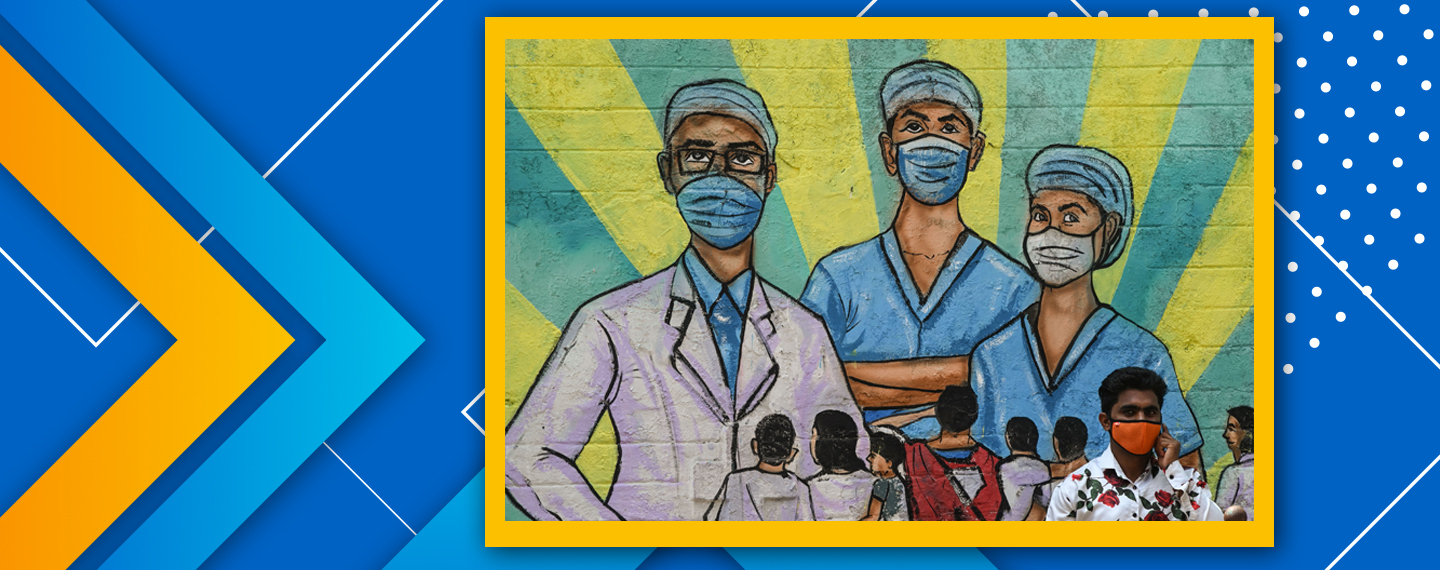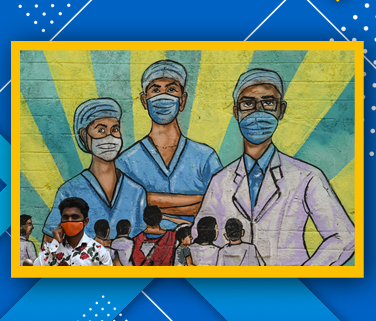Vinod Mattoo wondered if this was the last time he’d see his wife in their home in Mumbai.
He was already having trouble breathing as COVID-19 kept up its relentless assault on his lungs. His mind was racing: Is everything I need in the backpack? If I don’t come back, my wife doesn’t know the phone passwords. When was the last time the will was updated? The logistics of impending death felt overwhelming.
Across the room, amid the shelves stacked with books and paintings on the wall from fanciful trips to Philadelphia and Venice years ago, his in-laws watched him holding the backpack. Both of his wife’s parents had tested positive for COVID-19 earlier and had been quarantining in a room in the house. They were mostly asymptomatic. So was his wife, who had caught COVID-19 about the same time as Mattoo.
Kiran Mattoo started to cry. She had told herself not to. They had been married for 41 years and the weight of the moment was settling on both of them.
Mattoo told her he would be back soon.
He was trying to be brave, she thought.
Mattoo saw her eyes begin to glisten.
I don’t want to lose him, she thought. They hugged.
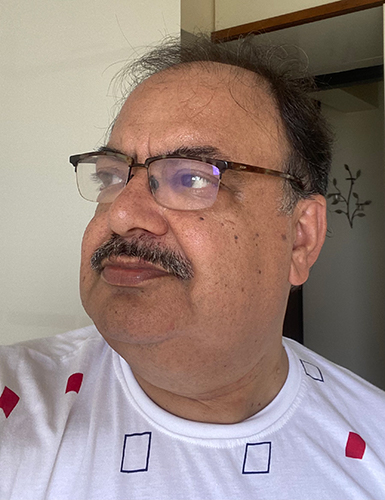
Photo courtesy of Vinod Mattoo.
He carried the backpack filled with some clothes, sanitizer, masks, note pad, pen, cash, an ID card and some religious pictures – including Ganesh – that his wife insisted he keep with him.
Mattoo then stepped out into the night air. The street was quiet. He got into the white ambulance that would take him to the hospital and where he hoped oxygen tanks might be waiting to help him breathe easier.
It would take about an hour to get from his home to Karuna Hospital. A medical worker in the back tried to talk with him. It was mostly a protocol to ensure he wasn’t falling into a coma. But breathing was hard and speaking was very difficult. His mind was also weighed down by swirling thoughts.
They rode the rest of the way in relative silence.
India Overwhelmed
The wave that has hit India in the past several weeks has been devastating. About 27 million cases of COVID-19 have been reported in India and there have been more than 307,000 deaths since the beginning of the pandemic last year. But since April – at his peak – the country had a rolling average of almost 400,000 cases per day.
The stories of Indians struggling to find oxygen tanks for loved ones of friends infected with the virus have been horrific and well-documented. Relief agencies have been sending supplies to assist the country but keeping up with the need has been difficult.
The Amgen Foundation last month donated $1.25 million to support countries battling COVID-19 and $500,000 of that total went to the Santa Barbara-based non-profit Direct Relief, which sent portable oxygen concentrators to India through a partnership with a medical company specializing in those devices.
The Amgen Foundation has also said it will match staff donations to Direct Relief, Project Hope, International Medical Corps, American India Foundation, CARE, Ekal Vidyalaya Foundation of USA, and Oxygen for India.
Amgen employees with ties to India had been worried about the toll the pandemic was taking on friends and loved ones amid the second wave of COVID-19.
Una Krisnan, chair of the Amgen Indian Sub-Continent Network at the Amgen Capability Center in Tampa Bay, said several family members living in India got the virus, including a cousin and his wife as well as her dad’s older brother. Her aunt, the one who used to enjoy going to the movies with her when she was growing up in Chennai, died of COVID a few months ago and left her uncle alone.
She said she checks in with him now as India struggles with the pandemic.
“He is scared to go out,” Krisnan said. “I just try to talk to him regularly so he knows he’s not alone – just listening to him so he knows people are there for him and that he feels cared for.”
Krisnan takes comfort, however, in one fact: Her uncle is vaccinated. That, she said, does give her some peace of mind.
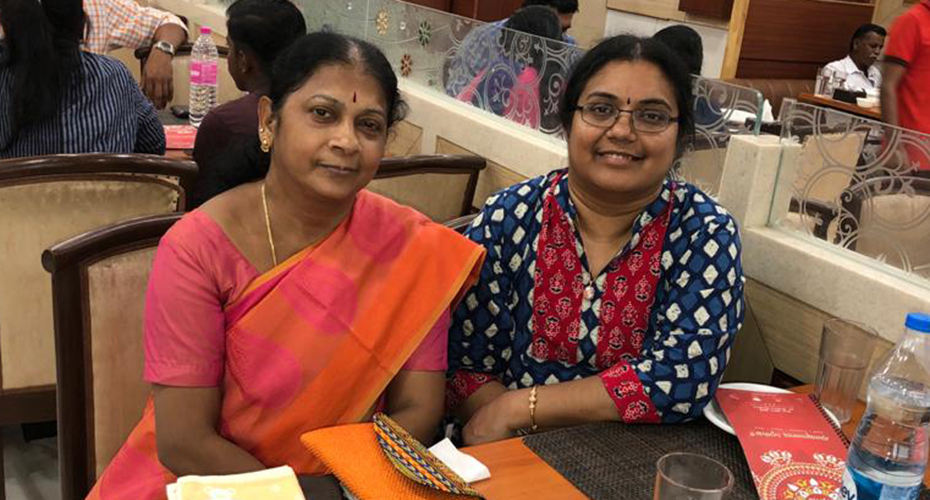
Una Krisnan (right) celebrated her aunt's birthday last February at a restaurant before the pandemic hit. Her aunt, Meenakshi Somasundaram (left), died of COVID-19. Photo courtesy of Una Krisnan.
Hospitalized
Mattoo said when he got to the hospital, he was gasping for air and still wasn’t sure what his fate might be. He remembered a neighbor being taken away in an ambulance and finding out later the person died the next day.
He also felt guilty.
“I looked around and there was a nurse looking after me,” Mattoo said. “Others weren’t so lucky.”
Annie Chan, his direct supervisor at Amgen based in Hong Kong, said she found out about Mattoo’s hospitalization the day after he was admitted. She was worried.
“I was seeing what everyone was seeing on the news and TV,” Chan said. “People dying outside hospitals, the large numbers of deaths and I wanted to make sure he was OK, but at the same time, I didn’t want to pressure him and keep asking him how he was.”
Mattoo said when he got hooked up to an oxygen concentrator in the hospital, he started to believe things would work out. He was getting text messages from family, friends and co-workers expressing concern daily as he lay in the bed. Some days, the messages were too much and he had to shut off his phone.
His wife said the video calls between them would also often be cut short as Mattoo would run out of breath quickly.
After eight days, seeing him lying there with the tubes snaked around his face and a mask on, she began to wonder how long he might be there. She felt helpless, but said she thanked God she could even just talk to him for just short periods of time. The time between those conversations felt interminable and she sometimes battled panicky thoughts at home.
“I was scared,” she said. “I didn’t know what else I could do.”
Two days later on a call, he told her the news she had been desperate to hear: He was coming home.
Aftermath
While India is still in the grips of the deadly second wave – with some saying it may not recede until July – Mattoo said he was grateful to survive. He said he felt fortunate as he held the backpack – the only thing he had taken with him the night the ambulance came.
His wife said she remembered when he got home and felt a mixture of relief, happiness and worry.
“I couldn’t believe he was standing there in front of me,” she said. “I wore my face shield and had gloves on. I hugged him.”
They had secured oxygen for him to have at home as he continued to recover from the virus. Kiran said she had trouble sleeping at night, fearful that a relapse could happen at any moment. During those first days, he was fatigued often and she had to help him do basic tasks.
Chan said she and others urged him to take It easy and rest before getting back to work.
During some of the early video meetings when he returned to work, he kept the camera off for the first few days. Mattoo said during the first meeting, he had trouble completing a sentence as the words fought with his lungs for precious air. When he finally did switch to video calls, Chan said she was so glad to see his face again, free of the oxygen concentrator.
But he said he is doing better now and COVID-19 changed him.
“When I was in the hospital, I was going through a lot of emotions,” he said. “I feel more strongly about some things. It’s not good now unless I’m able to make a difference.”
Mattoo said he started writing a blog about his experience. He is starting up a support group for people who got the virus and who also may be able to help those in need as the country struggles through the second wave. He has been one of the key voices providing insights to the Amgen Incident Management Team on ways to navigate the crisis.
Through these calls, the team in Asia Pacific have been able to organize home care kits, telehealth support and additional healthcare insurance coverage for our employees and family members in India.
Through it all, he keeps the small backpack near his desk as a small reminder of all he bore on his way to the hospital. And how he managed to bring everything back home again.
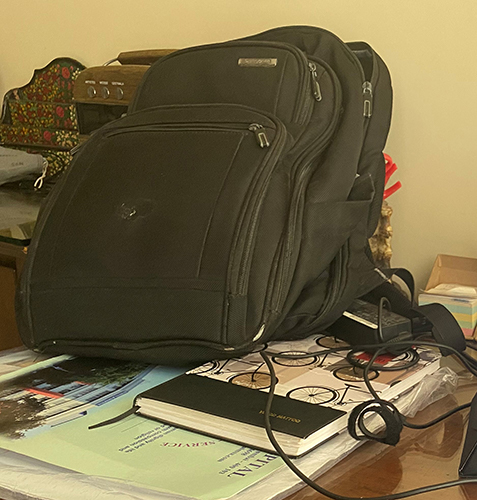
The backpack Vinod Mattoo took with him to the hospital after getting COVID-19. Photo courtesy of Vinod Mattoo.

